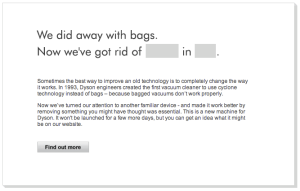
Monday morning, I received an email from Dyson US entitled “What has Dyson invented now?” I usually delete sales messages right away but having owned three Dyson vacuums over the years and spent some time poking around the website that celebrates his charmingly curious mind, I opened it up.
The headline inside read “We did away with bags. Now we’ve got rid of ___ in ____.” The copy went on to stress the familiar Dyson themes of re-imagining old technology, ultimately ending in a link to learn more. So I clicked that.
The link led to a slightly-overlong video of people staring, mouth agape, at some remarkable object just below camera. They couldn’t identify it but loved the object’s look. Clearly, it resembled nothing they’d ever seen. By the time I finished the video, Dyson had engaged me for three and a half minutes. But then they dropped the meat in the dirt…
They simply supered “October 2009” and ended the video. After investing all that time they gave me nothing, not even a glimpse of the unidentified object to pique my curiosity about what it might be. Frustrated, I combed the rest of their website but found nothing.
Suddenly, I kinda hated James Dyson. I hated his plastic contraptions, his British accent which I had long found intellectually appealing now rang twee, and the blueprints of other objects just looked like so much self indulgence.
The man had wasted my time. And I deeply, deeply resented it. Advocates tout the advantages of digital technology largely along the lines of engagement, user experience and information. Web users have come to expect that anything they need to know is just a few clicks away, and often more comprehensive than they need. But this tactic, which began with a simple, well-written email, dishonored those expectations. It treated this medium like TV, where I might see a teaser ad on “Family Guy” one week then see the corresponding explanatory ad the next week, since I watch that show regularly.
But there are no appointments with the web. It is always on, always available, and always presents an entirely fresh experience with little sense of prior history and absolutely no narrative arc. What had started as an awesome advertising launch tactic ultimately backfired, alienating an engaged user.
Happily, there’s something else unique to the web: you can adjust and edit your content in real time. So this morning, when I sat down to write about this madding experience, I clicked the link again and landed on a whole new page. Perhaps they received complaints, perhaps they noticed people left the site pretty quickly, or perhaps they embedded cookies so that anytime someone revisited the site they would receive an answer; whatever they did, they corrected the problem. And I was engaged once more.
His new item truly looks wildly original. Suddenly, I like James Dyson again. Good design and good will amongst men: both good things in this world.
Never trust a Brit, by Jove!
I guess my issue with Dyson is the pretentiousness with which he presents his products. He made a vacuum cleaner that many people like, not a vaccine.